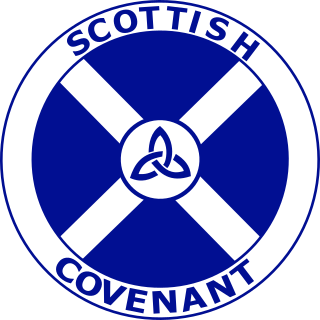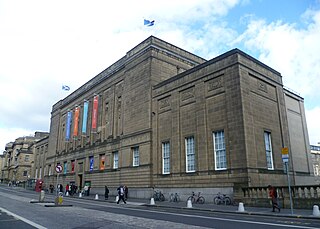
John MacDonald MacCormick was a Scottish lawyer, Scottish nationalist politician and advocate of Home Rule in Scotland.
Glasgow Kelvingrove was a burgh constituency represented in the House of Commons of the Parliament of the United Kingdom from 1918 until 1983. It elected one Member of Parliament (MP) using the first-past-the-post voting system. In February 1974 it absorbed the entire Glasgow Woodside Constituency which had existed from 1950 but lost the part of the Exchange Ward it had previously included to Glasgow Central.
Douglas Cuthbert Colquhoun Young was a Scottish poet, scholar, translator and politician. He was the leader of the Scottish National Party (SNP) 1942-1945, and was a classics professor at McMaster University and the University of North Carolina at Chapel Hill.

The Glasgow Camlachie by-election was held on Wednesday 28 January 1948, following the death of the sitting Member of Parliament, Campbell Stephen.

Sir Alexander McKenzie Livingstone was a Scottish Liberal Party politician.

Sir Duncan Ross McLarty, was an Australian politician and the 17th Premier of Western Australia.
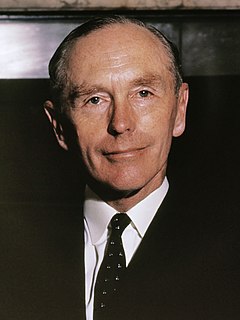
The Kinross and Western Perthshire by-election of 7 November 1963 was a by-election to the House of Commons. It was unique among by-elections since 1918 in that one of the candidates was the sitting Prime Minister, Sir Alec Douglas-Home; he was nominated for the constituency after disclaiming a peerage, as he felt he needed to be a member of the Commons rather than the House of Lords during his premiership. Douglas-Home won the election.
The Glasgow Govan by-election was held on 8 November 1973, following the death of John Rankin, Labour Party Member of Parliament for the Glasgow Govan constituency. Rankin had died one month earlier, on 8 October 1973. Rankin had held the seat since 1955. With the exception of a narrow Conservative victory in 1950, the seat had been solidly Labour-held since 1918. For the by-election the Labour Party nominated Harry Selby, a veteran activist in Glasgow and a former Trotskyist. It was later reported that Selby's selection had been controversial with some Labour members who felt that at the age of 61 he was too old to be starting a parliamentary career.
The Kilmarnock by-election, 1929 was a by-election held on 27 November 1929 for the British House of Commons constituency of Kilmarnock in Ayrshire.
The Combined Scottish Universities by-election, 1946 was a by-election held from 22 November to 27 November 1946 for the Combined Scottish Universities, a university constituency of the British House of Commons.
John Murray was a Scottish civil servant, university administrator and Liberal Party politician.
Robert Murray was a Scottish co-operator and politician who served briefly in Parliament as a member of the Labour Party.
The Glasgow Kelvingrove by-election of 13 March 1958 was held after the death of Conservative MP (MP) Walter Elliot.
Glasgow Tradeston constituency was created in 1885, and elected Liberal Archibald Corbett as their MP from then until he retired from the House of Commons in 1911 to take a seat in the House of Lords as 1st Baron Rowallan. Although Tradeston had consistently voted for Corbett, he did not consistently stand under the same label. In 1885 he stood as a Liberal against a Conservative. In 1886 following a split in the Liberal party he stood as a Liberal Unionist against a Liberal. Thereafter this was the normal contest until 1910. He had re-joined the Liberal party in 1908 but he did not win the official Liberal nomination in January 1910. This time standing as an Independent Liberal he scraped a victory against both Liberal and Conservative candidates. Then at the last general election, standing as the official Liberal candidate he won comfortably.
Ian McColl CBE, was a Scottish journalist, editor and Liberal Party politician.
The Ilkeston by-election was a Parliamentary by-election in Derbyshire. It returned one Member of Parliament to the House of Commons of the United Kingdom, elected by the first past the post voting system.
The Dundee East by-election was held on 17 July 1952 due to the death in a road accident of the incumbent Labour MP, Thomas Cook. It was won by the Labour candidate George Thomson.
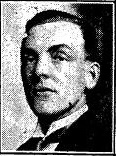
The East Fife by-election of 1933 was held on Thursday, 2 February 1933. The by-election was held due to the death of the sitting National Liberal MP, Sir James Duncan Millar. It was won by the National Liberal candidate James Henderson Stewart.
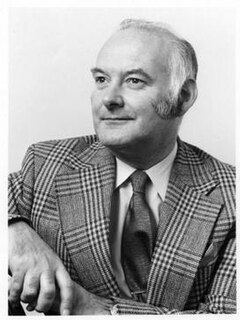
Thomas Ronald Leslie Fraser was a Scottish writer, broadcaster and Liberal Party politician. He was notable for standing as a candidate for the United Kingdom parliament, even though he was too young to be eligible to vote.

